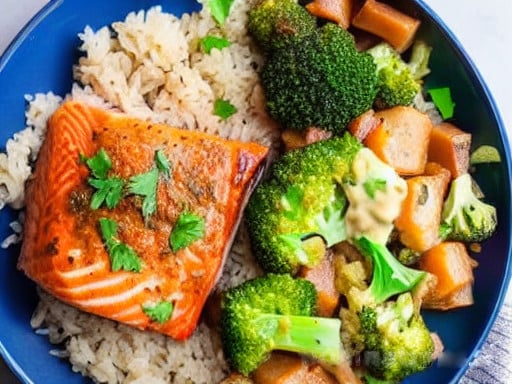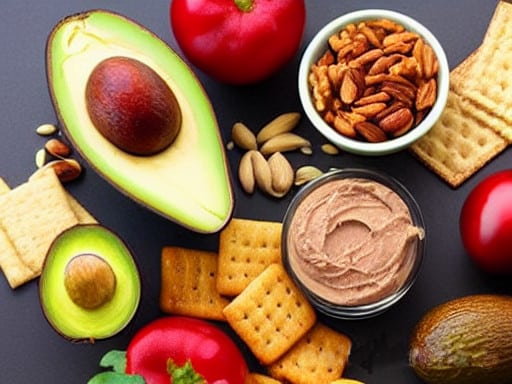Last Updated on July 7, 2024 by Max
Introduction
In a world where health is paramount, an often overlooked aspect of well-being is the role of diet in maintaining prostate health. This vital gland, responsible for many functions in the male reproductive system, deserves our attention and care. Today, we invite you to embark on a journey to explore the intimate relationship between nutrition and prostate-related conditions. By delving into this subject, we aim to empower our readers with valuable insights and practical advice to help nurture their prostate’s well-being. So, buckle up and prepare to be captivated by the critical link between what you eat and its lasting impact on your prostate health. Let’s unravel the mystery together, one bite at a time.
Nutrients Essential for Prostate Health
Our bodies are intricate systems that require a delicate balance of essential nutrients to function optimally. In the context of prostate health, specific vitamins, minerals, antioxidants, and anti-inflammatory compounds take center stage. Let’s examine these essential nutrients and explore their roles in maintaining a healthy prostate.
A. Vitamins and minerals beneficial for the prostate
- Vitamin D: Often referred to as the “sunshine vitamin,” Vitamin D plays a critical role in maintaining prostate health. Research has revealed that adequate levels of Vitamin D can help inhibit the growth of prostate cancer cells and reduce inflammation (1). Excellent sources of Vitamin D include fatty fish, egg yolks, and fortified dairy products.
- Zinc: This essential trace mineral is found in high concentrations in the prostate and supports its normal function. Studies have shown that zinc deficiency is associated with an increased risk of prostate-related issues, including cancer (2). To ensure sufficient zinc intake, consume foods like oysters, red meat, poultry, beans, and nuts. Although zinc is essential for overall health, excessive supplementation can lead to harmful side effects, such as nausea, vomiting, and even kidney and liver damage. Following the recommended dosage and consulting a healthcare professional before supplementing with zinc is crucial.
- Selenium: Another vital trace element, selenium, boasts antioxidant properties that protect the prostate from oxidative stress. Rich sources of selenium include Brazil nuts, seafood, and whole grains. Research suggests that adequate selenium intake may reduce the risk of developing prostate cancer (3).
B. Role of antioxidants and anti-inflammatory compounds
- Lycopene: A powerful antioxidant, lycopene is responsible for the red pigment in tomatoes, watermelon, and other fruits. Cooked tomato products like tomato sauce and paste are affluent in lycopene. Studies have demonstrated a strong link between lycopene consumption, reduced prostate cancer risk, and improve overall prostate health (4). Lycopene is considered safe but may cause mild side effects like stomach discomfort.
- Omega-3 fatty acids: Renowned for their anti-inflammatory properties, omega-3 fatty acids play an essential role in managing inflammation in the prostate. A diet rich in omega-3s may help reduce the risk of prostate-related conditions, including benign prostatic hyperplasia (BPH) and prostate cancer (5). Fatty fish, like salmon, mackerel, sardines, flaxseeds, and walnuts, are excellent sources of omega-3.
- Polyphenols. In abundance in plant-based foods, polyphenols are a group of antioxidants with anti-inflammatory and anti-carcinogenic properties. They have been linked to a reduced risk of prostate cancer and improved prostate health (6). Include a variety of fruits, vegetables, nuts, seeds, and legumes in your diet to reap the benefits of these potent compounds.
- Curcumin: Derived from turmeric, curcumin is a powerful antioxidant and anti-inflammatory compound. Studies have demonstrated that curcumin may help inhibit the growth and spread of prostate cancer cells and reduce prostate inflammation (7). Incorporate turmeric into your diet by adding it to soups, stews, and curries, or consider taking a curcumin supplement for added benefits.
Understanding the impact of these essential nutrients on prostate health is a crucial step in preventing and managing prostate-related conditions. Emphasizing cruciferous vegetables, curcumin, and the other nutrients mentioned earlier in your diet can be highly beneficial for maintaining a healthy prostate.
Foods That Support Prostate Health
Incorporating diverse nutrient-dense foods is crucial for maintaining overall well-being and promoting prostate health. Let’s explore the various food groups that contain prostate-friendly nutrients and how they contribute to the optimal prostate function.
A. Fruits and vegetables with prostate-friendly nutrients

- Tomatoes: Rich in lycopene, tomatoes provide powerful antioxidant support for prostate health. Cooking tomatoes enhances lycopene bioavailability, making tomato-based sauces and pastes ideal for consumption.
- Cruciferous Vegetables: This family of vegetables, including broccoli, cauliflower, cabbage, and Brussels sprouts, contains a unique compound called sulforaphane. Sulforaphane has been shown to possess potent anticancer properties, particularly for prostate cancer. Consuming a variety of cruciferous vegetables regularly can contribute to improved prostate health.
- Berries: Loaded with antioxidants, such as polyphenols, berries like blueberries, strawberries, and raspberries, help combat oxidative stress and promote a healthy prostate.
- Citrus Fruits: Oranges, grapefruits, and lemons are high in vitamin C, an antioxidant that supports the immune system and may help reduce inflammation.
B. Whole grains and their benefits for prostate health
- Whole Grains: Foods such as brown rice, quinoa, barley, and whole wheat provide essential nutrients, like fiber, vitamins, and minerals, that support prostate health. High-fiber diets have been linked to a reduced risk of prostate cancer.
- Legumes: Beans, lentils, and chickpeas are excellent sources of plant-based protein and fiber, contributing to a prostate-friendly diet.
C. Lean proteins and healthy fats for a balanced diet
- Fish: Rich in omega-3 fatty acids, fatty fish like salmon, mackerel, and sardines provide anti-inflammatory benefits and support prostate health.
- Poultry: Lean protein sources, such as chicken and turkey, are a better alternative to red and processed meats, which have been linked to an increased risk of prostate cancer.
- Nuts and Seeds: Almonds, walnuts, flaxseeds, and chia seeds are packed with healthy fats, antioxidants, and fiber, promoting prostate health and overall well-being.
By incorporating a variety of fruits, vegetables, whole grains, lean proteins, and healthy fats into your daily diet, you can significantly support prostate health and reduce the risk of prostate-related conditions.
Foods and Substances to Limit or Avoid
While certain foods contribute to a healthy prostate, others may have detrimental effects. It’s essential to be aware of these foods and substances to minimize their impact on prostate health. This chapter will discuss the items to limit or avoid and their potential consequences on prostate-related conditions.
A. Red and processed meats and their impact on the prostate
- Red Meat: Consuming high amounts of red meat, such as beef, lamb, and pork, has been linked to an increased risk of prostate cancer (8). Opting for leaner proteins like poultry and fish can be a healthier alternative.
- Processed Meat: Sausages, hot dogs, bacon, and other processed meats may contribute to prostate health issues due to their high sodium and preservative content. Limiting processed meat intake and choosing unprocessed, lean protein sources is advisable.
B. Excessive consumption of dairy products and prostate health risks
- Dairy Products. Some studies have suggested that high consumption of dairy products, including milk, cheese, and yogurt, may increase the risk of prostate cancer (9). Consume dairy products in moderation and consider plant-based alternatives, such as almond milk or soy yogurt, to maintain a balanced diet.
C. The role of alcohol, caffeine, and sugar in prostate-related conditions
- Alcohol: Excessive alcohol consumption has been linked to an increased risk of prostate cancer and other prostate-related conditions (10). It is essential to limit alcohol intake and follow the recommended guidelines of no more than two drinks per day for men.
- Caffeine: Although moderate caffeine consumption may not significantly impact prostate health, excessive intake can contribute to urinary symptoms in men with benign prostatic hyperplasia (BPH) (11). Try to limit your caffeine intake from coffee, tea, and energy drinks.
- Sugar: A diet high in added sugars may lead to obesity, a risk factor for prostate cancer and other prostate-related issues (12). Reducing the consumption of sugary drinks, desserts, and processed foods can help maintain a healthy weight and support prostate health.
By limiting or avoiding the consumption of red and processed meats, excessive dairy products, and harmful substances like alcohol, caffeine, and sugar, you can take proactive steps toward maintaining a healthy prostate and reducing the risk of prostate-related conditions.
Dietary Patterns That Promote Prostate Health
In this chapter, we will explore various diets and their benefits for the prostate and practical tips for incorporating prostate-friendly foods into daily meal planning.
A. The Mediterranean diet and its benefits for the prostate
Characterized by the high consumption of fruits, vegetables, whole grains, legumes, nuts, and healthy fats like olive oil, the Mediterranean diet may reduce the risk of prostate cancer and other prostate-related conditions (13). This diet emphasizes lean proteins, such as fish and poultry, while limiting red and processed meats, which is beneficial for prostate health.
B. Plant-based diets and their positive impact on prostate health
Diets rich in plant-based foods, including fruits, vegetables, whole grains, and legumes, may decrease the risk of prostate cancer and improve prostate health (14). These diets are high in fiber, antioxidants, and anti-inflammatory compounds, which support prostate function and overall well-being.
C. Incorporating prostate-friendly foods into daily meal planning
Breakfast: Opt for a bowl of oatmeal topped with berries, flaxseeds, and a drizzle of honey, or try a smoothie made with spinach, almond milk, banana, and a scoop of plant-based protein powder.

Lunch: Choose a mixed greens salad with a variety of colorful vegetables, grilled chicken, and a dressing made with olive oil and lemon juice. Alternatively, enjoy a quinoa salad with roasted vegetables and a sprinkling of nuts and seeds.

Dinner: Prepare a Mediterranean-inspired meal with baked salmon, steamed broccoli, and a side of brown rice or whole-grain pasta. Or, opt for a vegetable stir-fry with tofu and a side of whole-grain noodles.

Snacks: Choose fresh fruits, vegetable sticks with hummus, a handful of nuts, or whole-grain crackers with avocado or nut butter.

Adopting dietary patterns like the Mediterranean or a plant-based diet and incorporating prostate-friendly foods into your daily meal planning can significantly improve prostate health and reduce the risk of prostate-related conditions.
Lifestyle Factors That Affect Prostate Health
A. The role of exercise in maintaining a healthy prostate
Regular physical activity positively impacts prostate health by reducing inflammation, enhancing immune function, and promoting hormonal balance (15). Combining aerobic, resistance, and flexibility exercises can support overall well-being and reduce the risk of prostate-related conditions.
The American Cancer Society recommends adults engage in at least 150 minutes of moderate-intensity or 75 minutes of vigorous-intensity aerobic activity per week, along with muscle-strengthening activities at least two days per week (16).
B. Managing stress and its impact on prostate health
Chronic stress can have a negative impact on prostate health by increasing inflammation and compromising immune function (17). Learning to manage stress through relaxation techniques, mindfulness practices, and hobbies can support prostate health and overall well-being.
Some effective stress reduction techniques include deep breathing exercises, progressive muscle relaxation, meditation, and yoga. Incorporating these practices into your daily routine can help promote relaxation and reduce the impact of stress on prostate health.
C. Importance of maintaining a healthy weight
Maintaining a healthy weight is crucial for prostate health, as obesity has been linked to an increased risk of developing prostate cancer and other prostate-related conditions (18). Adopting a balanced diet, engaging in regular physical activity, and managing stress can contribute to achieving and maintaining a healthy weight.
Body Mass Index (BMI): BMI is useful for assessing whether an individual is within a healthy weight range. A healthy BMI is between 18.5 and 24.9, while overweight or obese is when a BMI is 25 or higher.
Adopting a healthy lifestyle that includes regular exercise, stress management, and maintaining a healthy weight can significantly contribute to optimal prostate health and reduce the risk of prostate-related conditions.
Conclusion
Prostate health is an essential aspect of men’s overall well-being, and nutrition plays a significant role in promoting a healthy prostate and reducing the risk of prostate-related conditions. By adopting a balanced, nutrient-rich diet that includes prostate-friendly foods, supplements, and dietary patterns, you can support your prostate health and help prevent potential issues.
In addition to diet, it’s crucial to adopt a healthy lifestyle, including regular exercise, stress management, and maintaining a healthy weight. Remember that small, sustainable changes in your daily routine can make a lasting impact on your health.
Consult with healthcare professionals, such as doctors and registered dietitians, for personalized advice and guidance on how to optimize your nutrition and lifestyle choices for prostate health. By staying informed and making informed decisions, you can take control of your prostate health and improve your overall quality of life.
Literature
- Fleet, J. C. (2012). The role of vitamin D in the endocrinology controlling calcium homeostasis. Molecular and Cellular Endocrinology, 353(1-2), 34-42.
- Costello, L. C., & Franklin, R. B. (2006). The clinical relevance of the metabolism of prostate cancer; zinc and tumor suppression: connecting the dots. Molecular Cancer, 5, 17.
- Rayman, M. P. (2012). Selenium and human health. The Lancet, 379(9822), 1256-1268.
- Giovannucci, E. (2002). A review of epidemiologic studies of tomatoes, lycopene, and prostate cancer. Experimental Biology and Medicine, 227(10), 852-859.
- Szymanski, K. M., Wheeler, D. C., & Mucci, L. A. (2010). Fish consumption and prostate cancer risk: a review and meta-analysis. The American Journal of Clinical Nutrition, 92(5), 1223-1233.
- Pandey, K. B., & Rizvi, S. I. (2009). Plant polyphenols as dietary antioxidants in human health and disease. Oxidative Medicine and Cellular Longevity, 2(5), 270-278.
- Schellhammer, P. F., & Venner, P. (2021). The Role of Curcumin in the Prevention and Management of Prostate Cancer: A Review of Preclinical and Clinical Studies. Nutrients, 13(10), 3523.
- Sinha, R., Cross, A. J., Graubard, B. I., Leitzmann, M. F., & Schatzkin, A. (2009). Meat intake and mortality: a prospective study of over half a million people. Archives of Internal Medicine, 169(6), 562-571.
- Aune, D., Navarro Rosenblatt, D. A., Chan, D. S., Vieira, A. R., Vieira, R., Greenwood, D. C., … & Norat, T. (2015). Dairy products, calcium, and prostate cancer risk: a systematic review and meta-analysis of cohort studies. The American Journal of Clinical Nutrition, 101(1), 87-117.
- Zhao, J., Stockwell, T., Roemer, A., & Chikritzhs, T. (2016). Is alcohol consumption a risk factor for prostate cancer? A systematic review and meta-analysis. BMC Cancer, 16(1), 1-12.
- Parsons, J. K., Im, R. (2014). Caffeine Intake is Independently Associated with Risk of Lower Urinary Tract Symptoms in Men but Not in Women. Journal of Urology, 192(4), 1045-1050.
- World Cancer Research Fund/American Institute for Cancer Research. (2018). Diet, Nutrition, Physical Activity and Prostate Cancer. Continuous Update Project Expert Report.
- Kenfield, S. A., DuPre, N., Richman, E. L., Stampfer, M. J., Chan, J. M., & Giovannucci, E. L. (2014). Mediterranean diet and prostate cancer risk and mortality in the Health Professionals Follow-up Study. European Urology, 65(5), 887-894.
- Tantamango-Bartley, Y., Knutsen, S. F., Knutsen, R., Jacobsen, B. K., Fan, J., Beeson, W. L., … & Fraser, G. E. (2016). Are strict vegetarians protected against prostate cancer? The American Journal of Clinical Nutrition, 103(1), 153-160.
- Friedenreich, C. M., & Kenfield, S. A. (2016). Physical activity and prostate cancer: a systematic review of the epidemiologic evidence. Cancer Causes & Control, 27(5), 609-619.
- American Cancer Society. (2018). American Cancer Society Guidelines on Nutrition and Physical Activity for Cancer Prevention.
- Antonova, L., & Aronson, K. (2011). Stress and breast cancer: from epidemiology to molecular biology. Breast Cancer Research, 13(2), 1-7.
- Allott, E. H., Masko, E. M., & Freedland, S. J. (2013). Obesity and prostate cancer: weighing the evidence. European Urology, 63(5), 800-809.
